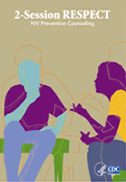RESPECT: Brief and Enhanced Client-focused HIV Prevention Counseling Interventions
The Research
The Science Behind the Package
 RESPECT has two, one-on-one, client-focused HIV prevention counseling interventions: “brief counseling” (two sessions) and “enhanced counseling” (four sessions). The interventions seek to reduce high-risk sexual behaviors and prevent new sexually transmitted infections. RESPECT is based on the Theory of Reasoned Action, which explains how behaviors are guided by attitudes, beliefs, experiences, and expectations of other persons’ reactions, and on Social Cognitive Theory, which states that persons learn by observing other people successfully practice a new behavior.
RESPECT has two, one-on-one, client-focused HIV prevention counseling interventions: “brief counseling” (two sessions) and “enhanced counseling” (four sessions). The interventions seek to reduce high-risk sexual behaviors and prevent new sexually transmitted infections. RESPECT is based on the Theory of Reasoned Action, which explains how behaviors are guided by attitudes, beliefs, experiences, and expectations of other persons’ reactions, and on Social Cognitive Theory, which states that persons learn by observing other people successfully practice a new behavior.
Target Population
Heterosexual persons (14 years and older) attending STD clinics
Interventions
The “Brief Counseling” intervention consists of two, 20-minute, one-on-one, interactive counseling sessions. The counselor uses a structured protocol to guide delivery of the intervention as it was researched. In session one, the counselor seeks to enhance a client’s perception of their risk for HIV infection and their level of concern related to possible infection and to elicit the details of recent risk incidents. In discussion with the client, the counselor points out the client’s triggers, circumstances, vulnerabilities, and patterns of risk-taking behavior. The session leads to a negotiated plan for reducing risk, including referrals to resources to support risk reduction. HIV antibody testing is offered to the client at the end of the first session. In session two, the counselor provides the result of the HIV test, helps the client understand the test result, discusses implications of the result for the client’s health and future HIV risk or referral needs, and provides additional support for risk reduction plans and partner counseling and referral. The “Enhanced Counseling” consists of one 20-minute and three 60-minute, one-on-one, interactive, counseling sessions delivered over four weeks. Session one is similar to the first session of the “Brief Counseling” intervention. Session two emphasizes increasing condom use self-efficacy. Session three provides HIV test results and focused discussion on condom attitudes. Session four focuses on perception of norms regarding condom use. Each session ends with a goal-setting exercise and encouragement of condom use as a long-term risk-reduction goal.
Research Results
Compared with participants in the comparison condition, men and women in both interventions:
- Reported significantly greater condom use and reduction of risk behaviors
- Had fewer new sexually transmitted infections
For Details on the Research Design
Kamb ML, Fishbein M, Douglas JM, Rhodes F, Rogers J, Bolan G, Zenilman J, Hoxworth T, Malotte K, Iatesta M, Kent C, Lentz A, Graziano S, Beyers RH, Peterman TA, for the Project RESPECT Study Group. (1998). Efficacy of Risk-Reduction Counseling to Prevent Human Immunodeficiency Virus and Sexually Transmitted Diseases: A Randomized Controlled Trial.
Journal of the American Medical Association, 280:1161-67. Or visit the Project RESPECT web page
The Intervention
A Package Developed from Science
Replicating Effective Programs (REP) is a CDC-initiated project that supports the translation of evidence-based HIV/AIDS prevention interventions into everyday practice, by working with the original researchers in developing a user-friendly package of materials designed for prevention providers. The two RESPECT models are REP interventions and are the product of extensive collaboration among researchers who originally developed and evaluated the interventions and the health departments that implemented the interventions. The package has been field-tested by prevention program staff.
Core Elements
Core elements are intervention components that must be maintained without alteration to ensure program effectiveness.
The core elements of brief and enhanced RESPECT interventions include:
- Conducting one-on-one counseling focusing on the client’s risk
- Offering HIV-antibody testing with the intervention
- Following the protocol completely
- Focusing on the client’s specific risk behaviors that put them at risk for HIV and other STDs
- Negotiating a realistic and achievable risk-reduction step
- Developing, implementing, and maintaining quality assurance procedures
For the enhanced intervention only:
- Focusing on the client’s beliefs, self-efficacy, attitudes, and norms regarding safe sex
Package Contents
- A manual of the brief, 2-session RESPECT with a step-by-step protocol
- A manual of the enhanced, 4-session RESPECT with a step-by-step protocol
- A 60-minute video that demonstrates correct RESPECT model counseling skills
- A quality assurance protocol
Timeline for Availability
The package is available from CDC along with training on program implementation and technical assistance.
For More Information on RESPECT Package
To find out more about future trainings, please visit http://effectiveinterventions.org.
- Page last reviewed: February 22, 2017
- Page last updated: February 22, 2017
- Content source: Division of HIV/AIDS Prevention, National Center for HIV/AIDS, Viral Hepatitis, STD, and TB Prevention, Centers for Disease Control and Prevention


 ShareCompartir
ShareCompartir